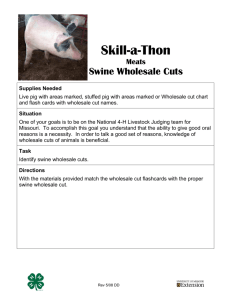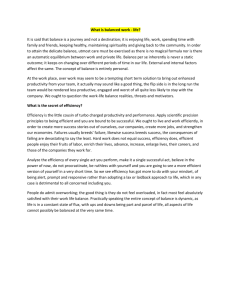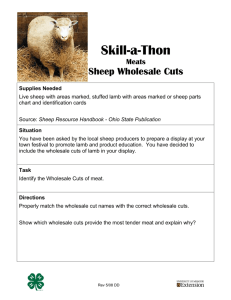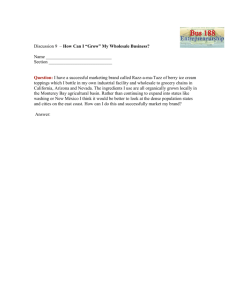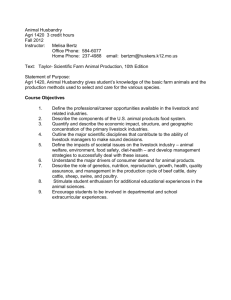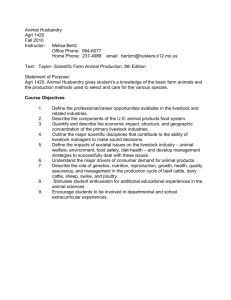RHS Weekly Lesson Plan Template: Bennett Jacobs –Animal
advertisement
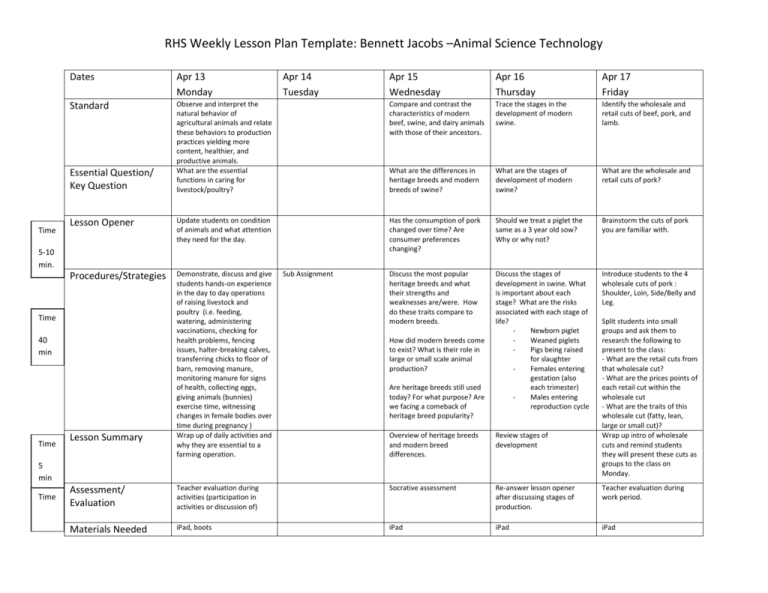
RHS Weekly Lesson Plan Template: Bennett Jacobs –Animal Science Technology Dates Apr 13 Monday Standard Apr 15 Wednesday Apr 16 Thursday Apr 17 Friday Observe and interpret the natural behavior of agricultural animals and relate these behaviors to production practices yielding more content, healthier, and productive animals. What are the essential functions in caring for livestock/poultry? Compare and contrast the characteristics of modern beef, swine, and dairy animals with those of their ancestors. Trace the stages in the development of modern swine. Identify the wholesale and retail cuts of beef, pork, and lamb. What are the differences in heritage breeds and modern breeds of swine? What are the stages of development of modern swine? What are the wholesale and retail cuts of pork? Lesson Opener Update students on condition of animals and what attention they need for the day. Has the consumption of pork changed over time? Are consumer preferences changing? Should we treat a piglet the same as a 3 year old sow? Why or why not? Brainstorm the cuts of pork you are familiar with. Procedures/Strategies Demonstrate, discuss and give students hands-on experience in the day to day operations of raising livestock and poultry (i.e. feeding, watering, administering vaccinations, checking for health problems, fencing issues, halter-breaking calves, transferring chicks to floor of barn, removing manure, monitoring manure for signs of health, collecting eggs, giving animals (bunnies) exercise time, witnessing changes in female bodies over time during pregnancy ) Wrap up of daily activities and why they are essential to a farming operation. Discuss the most popular heritage breeds and what their strengths and weaknesses are/were. How do these traits compare to modern breeds. Discuss the stages of development in swine. What is important about each stage? What are the risks associated with each stage of life? Newborn piglet Weaned piglets Pigs being raised for slaughter Females entering gestation (also each trimester) Males entering reproduction cycle Introduce students to the 4 wholesale cuts of pork : Shoulder, Loin, Side/Belly and Leg. Essential Question/ Key Question Time Apr 14 Tuesday 5-10 min. Time 40 min Time Lesson Summary Sub Assignment How did modern breeds come to exist? What is their role in large or small scale animal production? Are heritage breeds still used today? For what purpose? Are we facing a comeback of heritage breed popularity? Overview of heritage breeds and modern breed differences. Review stages of development 5 min Time Split students into small groups and ask them to research the following to present to the class: - What are the retail cuts from that wholesale cut? - What are the prices points of each retail cut within the wholesale cut - What are the traits of this wholesale cut (fatty, lean, large or small cut)? Wrap up intro of wholesale cuts and remind students they will present these cuts as groups to the class on Monday. Assessment/ Evaluation Teacher evaluation during activities (participation in activities or discussion of) Socrative assessment Re-answer lesson opener after discussing stages of production. Teacher evaluation during work period. Materials Needed iPad, boots iPad iPad iPad RHS Weekly Lesson Plan Template: Bennett Jacobs –Animal Science Technology
